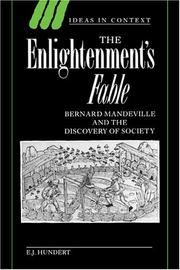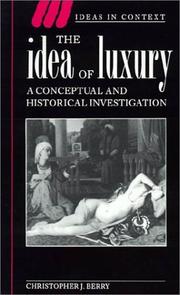| Listing 1 - 2 of 2 |
Sort by
|

ISBN: 0521460824 0521619424 0511584741 0511005814 9780511005817 9780511584749 9780521460828 9780521619424 Year: 1994 Publisher: Cambridge : Cambridge University Press,
Abstract | Keywords | Export | Availability | Bookmark
 Loading...
Loading...Choose an application
- Reference Manager
- EndNote
- RefWorks (Direct export to RefWorks)
The apprehension of society as an aggregation of self-interested individuals, connected only by bonds of envy, competition, and exploitation, is a dominant modern concern, but one first systematically articulated during the European Enlightenment. The Enlightenment's 'Fable' approaches this problem from the perspective of the challenge offered to inherited traditions of morality and social understanding by the Anglo-Dutch physician, satirist and philosopher, Bernard Mandeville. Mandeville's infamous paradoxical maxim 'private vices, public benefits' profoundly disturbed his contemporaries, while his Fable of the Bees had a decisive influence on David Hume, Jean-Jacques Rousseau, Adam Smith and Immanuel Kant. Professor Hundert examines the sources and strategies of Mandeville's science of human nature and the role of his ideas in shaping eighteenth century economic, social and moral theories.
Economic man --- Enlightenment --- Self-interest --- Conduct of life --- Self --- NIMBY syndrome --- Aufklärung --- Eighteenth century --- Philosophy, Modern --- Rationalism --- Homo oeconomicus --- Human beings --- Economics --- Mandeville, Bernard --- -Mandeville, Bernard --- -Contributions in economics --- Contributions in sociology --- Economism --- Economisme --- Eigenbelang --- Contributions in economics --- Mandeville, Bernard, --- Social Sciences --- Political Science --- Self-interest. --- Economic man. --- Enlightenment. --- Sociology --- History. --- Social theory --- Social sciences

ISBN: 0521466911 0521454484 0511558368 Year: 1994 Volume: 30 Publisher: Cambridge : Cambridge university press,
Abstract | Keywords | Export | Availability | Bookmark
 Loading...
Loading...Choose an application
- Reference Manager
- EndNote
- RefWorks (Direct export to RefWorks)
In this far-ranging and innovative study Christopher Berry explores the meanings and ramifications of the idea of luxury. Insights from political theory, philosophy and intellectual history are utilised in a sophisticated conceptual analysis that is complemented by a series of specific historical investigations. Dr Berry suggests that the value attached to luxury is a crucial component in any society's self-understanding, and shows how luxury has changed from being essentially a negative term, threatening social virtue, to a guileless ploy supporting consumption. His analytic focus upon the interplay between the notions of need and desire suggests that luxuries fall into four categories - sustenance, shelter, clothing and leisure - and these are exemplified in sources as diverse as classical philosophy and contemporary advertising.
History of civilization --- Luxury --- Luxe --- History. --- Philosophy --- Histoire --- Philosophie --- Economics --- Wealth --- Cost and standard of living --- Leisure class --- History --- Arts and Humanities --- LUXE --- MANDEVILLE (BERNARD) --- HUME (DAVID), PHILOSOPHE ANGLAIS, 1711-1776 --- SMITH (ADAM), 1723-1790 --- HISTOIRE --- CRITIQUE ET INTERPRETATION --- PENSEE POLITIQUE ET SOCIALE
| Listing 1 - 2 of 2 |
Sort by
|

 Search
Search Feedback
Feedback About UniCat
About UniCat  Help
Help News
News